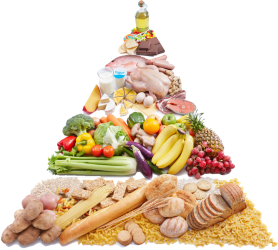How to eat healthy
Today, all physicians and nutritionists agree on the need for healthy nutrition, which can be summarized in a few words: less refined products, less processed products, less sugar, less salt, less bad fat, less consumption Prepared foods and contamination of our foods with toxins and pesticides.
In other words, "healthy eating" means choosing the "right food" for meals.
But do not forget that healthy eating means:
Eat your meal properly, take the time to chew to help digest and absorb food better. Chewing for 15 to 20 minutes after a meal, triggers the release of a neurotransmitter that signals the brain to stop eating. This signal, which is triggered by fatty and sweet foods, no matter how delicious they may be, interferes with eating and giving up food.
Rediscover the true taste of food. Our sense of taste is often disturbed by additives, flavor enhancers, artificial flavorings, emulsifiers, etc., which make all foods taste the same. Rediscover different regional and seasonal products, these will also help you in a healthy diet.
Cook for yourself every once in a while. Cooking encourages you to take care of yourself and others, keep in touch with food, change it…
Invite others for food. There is nothing like having a meal in a good and friendly atmosphere.
Healthy eating: A few daily habits
Eat a richer meal in the morning instead of at night. Remember the proverb "Eat breakfast like a king, lunch like a prince and dine like a poor man."
Chew your food slowly. Avoid digestive problems, appreciate flavors, and receive filling signals.
Use fresh products as much as possible. Say yes to local and seasonal products. Transportation, maintenance, storage, etc. all reduce the quality of food.
Use raw fruits between meals. Consuming them during meals slows down the digestive process. Suitable times for fruit consumption will be 10:00 to 11:00 and 17:00 to 18:00.
Eat raw products such as vegetables at the beginning of the meal. They stimulate the secretion of beneficial digestive enzymes.
Practical guide:
Breakfast rich in protein
High quality chicory tea or sweat, plus one of the following:
- 2 soft boiled eggs
- Whole grain rice with raisins + seasonal fruit
- 1 piece of seasonal fruit at 10.00
Lunch
Seasonal raw vegetables (sauce: virgin first press oil + apple cider vinegar)
Steamed vegetables (organic or home-grown vegetables, preferably seasonal products).
A protein of your choice (see below)
Tea
Generally for kids only:
Fresh or dried fruits, whole or semi-whole organic cereals, oilseeds.
Dinner
Light, fast food, no meat to reduce insomnia and sleep problems.
Prefer fatty fish and vegetable protein.
Depending on your appetite and season: Raw vegetables + legumes + cereals or vegetable soup mixed with cereals or salads.
If you want sweets after a meal, preferably eat cooked fruit, vegetable milk cream, homemade fruit tarts and the like.
Recommendations
Animal and vegetable proteins
Meat: up to 3 times a week
Fish: At least twice a week
Eggs: 4 to 6 per week
Goat or ewe cheese: 2 to 3 times a week
Tofu (soybeans) or legumes (lentils, quinoa, chopped chickpeas): 2 to 3 times a week (legumes should be eaten especially in autumn and winter)
Whole or semi-whole grains: Bread, pancakes, cooked cereals, reduce the amount in the summer.
In summer, think of sprouted grains (wheat germ, mung bean sprouts, etc.)
Nutritional recommendations
Foods to consider:
Virgin First Cold Press Oils; Replace olive and sunflower oil, canola, sesame and grape seed oil.
Healthy and natural seasonal products, preferably local and organic food, home-cooked food
Sugar, honey, pollen, raisins. Alternatives: rice pudding (soy, barley), fruit, dried fruits (autumn and winter), cooked apples, a small amount of organic chocolate, seed oil (almonds, walnuts, hazelnuts)
Fresh fruit or juice (vitamins and fiber)
Hot drinks (chicory, coffee substitutes with cereals, green tea, soft drinks)
Wholemeal or semi-wholemeal flour and cereals, wholemeal bread
Sea salt, algae
Vegetable milk (soy, rice, barley), limited amounts of goat or sheep cheese
1 to 1.5 liters of water per day between meals
Items to be limited:
Refined or cold pressed oils (use of extraction solvents plus refining)
Prepared meals (processed), canned food, food rich in additives or dyes.
Refined white sugar, jams, pastries, cakes, chocolate
Commercial fruit juices (acidifiers and sugars, preservatives)
Stimulants: coffee, tea (long-term fatigue of the body)
Consumption of alcohol
White flour, white bread
Refined salt
Cow's milk and related dairy products: yogurt, butter, desserts, ice cream
Drink water while eating

